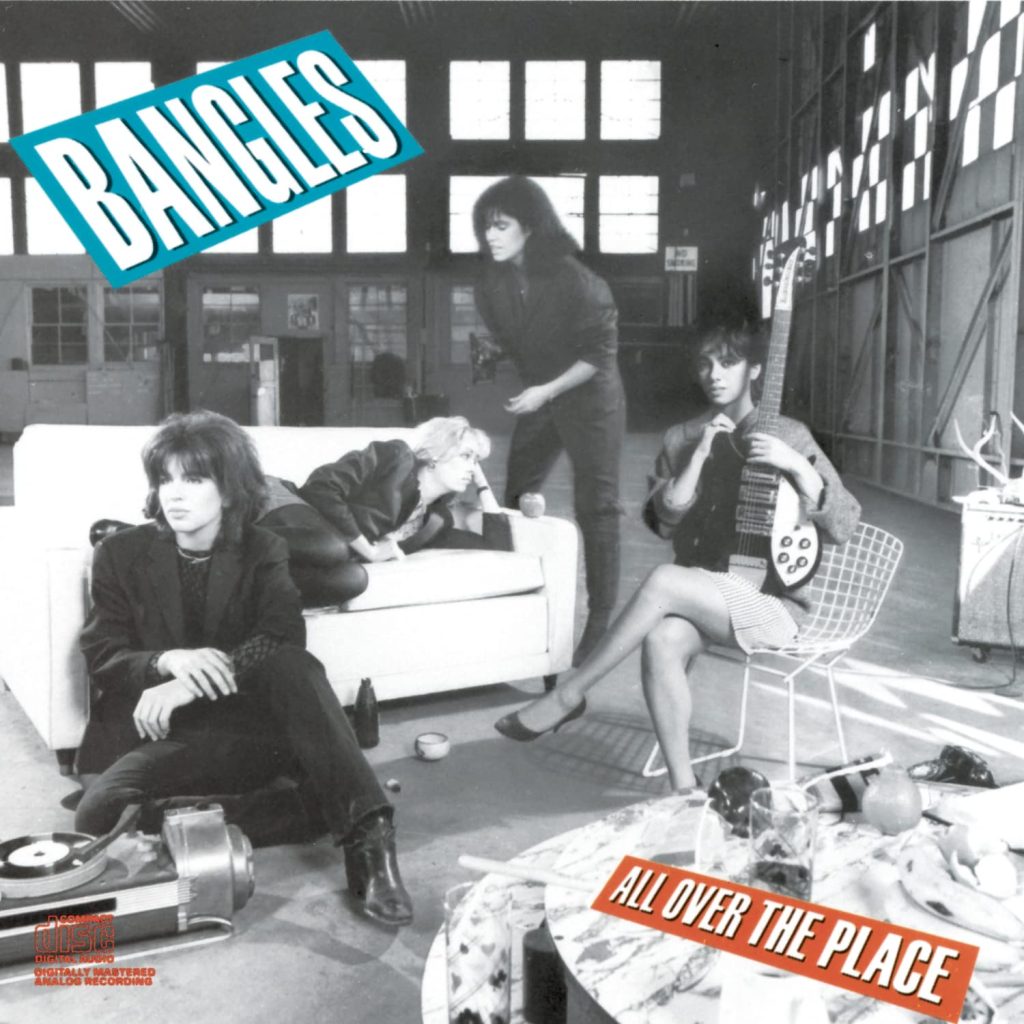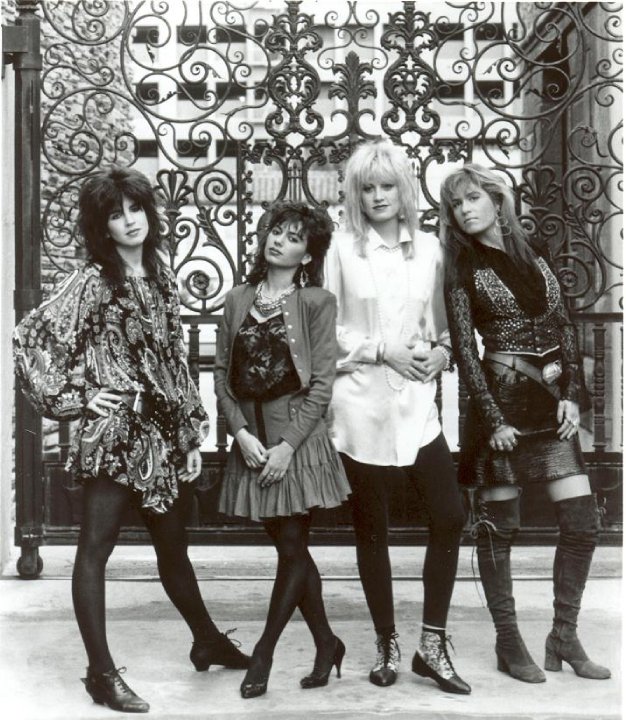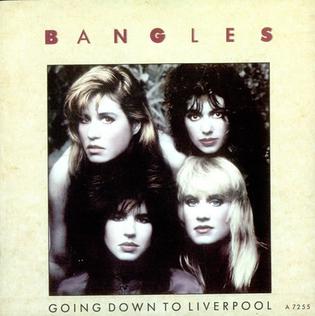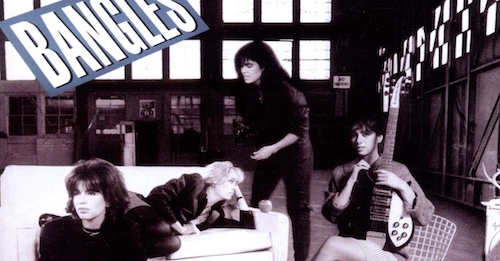 You can hear the Bangles’ love for British Invasion pop in every chord and every harmony in their first full-length album and major label debut, spring 1984’s All Over the Place. Moreover, you can also hear a band charting its own distinct sound and persona.
You can hear the Bangles’ love for British Invasion pop in every chord and every harmony in their first full-length album and major label debut, spring 1984’s All Over the Place. Moreover, you can also hear a band charting its own distinct sound and persona.
The album, released on May 23, marked The Bangles’ signing to Columbia Records, following their self-titled 1983 debut EP, released on I.R.S. Records. It also heralded a new bass player, Michael Steele, who replaced founding bassist Annette Zalinskas. Zalinskas, who’s heard on the Bangles’ inaugural EP, shortly thereafter departed to join the early cowpunk L.A. band Blood on the Saddle as lead singer.
Arguably the album’s most profound change was Columbia’s selection of a major league producer, David Kahne, who had freshly joined Columbia proper from San Francisco-based, CBS-distributed 415 Records (Romeo Void, Translator, Red Rockers) and that city’s Automatt recording studio.
Kahne declined to comment for this story, under a friendly-enough pretext: “I’m still working with bands and don’t want them to think I’d rat them out. Also I might write my own book one day.”

But Bangles lead guitarist, backing (and occasionally lead) vocalist and songwriter Vicki Peterson was happy to describe the scene:
“When we walked into the studio to record our first Columbia album, we were pretty green,” she says. “Aside from a self-produced 45 and the EP we’d recorded recently, we’d had maybe a few hours’ experience in a studio making demos, and didn’t know a lot about the tricks and disciplines of recording. We arrived with our much more relaxed, punk rock, DIY attitudes in contrast with our producer David Kahne, who had the weight of a major label—and its budget—on his head. He had his work cut out for him.
“I learned a great deal from him,” she added, “some of which took years to unlearn.”
When most people think of All Over the Place, they’re apt to think of its two singles, “Hero Takes a Fall” and “Going Down to Liverpool,” and perhaps “Live,” which received airplay as well. “Hero” was a band composition, penned by Peterson and lead singer and rhythm guitarist Susanna Hoffs, while “Live” (which rhymes with “give,” not “five”) was a 1967 hit for the L.A. band Merry-Go-Round, written by that band’s late lead singer, Emitt Rhodes. “Liverpool” was a cover of a more recent 1983 song by Katrina and the Waves, written by the band’s edgy guitarist Kimberley Rew, who’d begun his career with Robyn Hitchcock in the Soft Boys, and rejoined Hitchcock (by then a solo artist) after departing the Waves.
But the album’s real revelation was how capable both Peterson and Hoffs had emerged as songwriters in their own right. The two co-wrote four of the album’s tracks, and Peterson alone contributed five. Together they wrote what is probably the fourth best-remembered song on the album, the hooky “Dover Beach,” which features a great Peterson guitar solo. Vicki’s “James,” lamenting a former lover, today boasts the album’s third most spins on Spotify.
According to Peterson, “I’d written some of the songs on All Over the Place a few years prior when my sister Debbi, our friend and bass player, Amanda (Hills) Podany, and I were playing clubs around Los Angeles. ‘James’ and ‘He’s Got a Secret’ were both songs I’d already been singing for a while when I brought them into the Bangles. Kahne made it pretty clear that he preferred Susanna’s voice on them. And ultimately I agreed—she sounded great.”
 Cementing Hoffs’ role as primary lead singer was not a problem; Vicki and Debbi, the Bangles’ drummer, still sang two or three apiece, with Debbi singing on both “Live” and “Going Down to Liverpool.” Even with Hoffs positioned at front and center onstage, the band members would continue to alternate lead vocals throughout their recording career.
Cementing Hoffs’ role as primary lead singer was not a problem; Vicki and Debbi, the Bangles’ drummer, still sang two or three apiece, with Debbi singing on both “Live” and “Going Down to Liverpool.” Even with Hoffs positioned at front and center onstage, the band members would continue to alternate lead vocals throughout their recording career.
But Vicki does recall a few scuffles with Kahne, mainly of the variety that fall into the category of “all in a day’s work” between any artist and producer.
“I went toe to toe with [Kahne] over the string arrangement on ‘More Than Meets the Eye,’” she says. “I was adamant that there would be no synthesizers on this Bangles record (inspired by Queen’s declaration on their first album). And although it would stretch the budget, Kahne finally agreed to a string sextet, arranged by himself and the iconic Jimmie Haskell. Sitting in on that string session was one of those I-can’t-believe-I’m here moments for me.”
Reviews of All Over the Place were generally favorable. Robert Christgau, who seldom met an album for which he didn’t hedge his overall praise, wrote in his Village Voice Consumer Guide, “Though the style is as derivative and even retro as on EP, they don’t seem to be dabbling any more. Maybe they project such confidence because they know exactly what they want to say: don’t fuck me over.” AllMusic’s 4.5-star review was more sanguine: “The round-robin lead vocals, stellar harmonies, and tight, concise arrangements make them sound like a real-deal rock band. And the set’s gentle but insistent sway from British Invasion-styled rock and West Coast pop feels natural, unforced, and effective.”
In 2008, the album was re-released on Wounded Bird Records, a reissue label from the Albany, N.Y., metro area, with a “single remix” version of “Hero Takes a Fall.” The mix was presumably done by Grammy winner Joe Chiccarelli, whose credits range from Stan Ridgway to Spoon, the Shins and the Raconteurs.
Two years later, the U.K. label Cherry Pop Records reissued the album with a previously unreleased track, a cover of the Grass Roots’ 1966 hit “Where Were You When I Needed You” written by P.F. Sloan and Steve Barri.
The album reached its chart apex at #80 on the Billboard 200 album chart, and the two songs released as singles did not chart at all. But if one listened to the burgeoning “modern rock” formatted radio stations like L.A.’s KROQ-FM and Long Island’s WDRE-FM or even stations that would eventually be classified as Adult Alternative (i.e., Chicago’s WXRT-FM)—not to speak of MTV—the album felt like a career breakthrough for the Bangles.
And in fact, the Bangles’ next album, 1986’s Different Light, did propel the band to the upper reaches of the charts (#2 on the Billboard 200), buoyed by the Liam Sternberg composition “Walk Like An Egyptian” (#1 on the Billboard Hot 100) and the Prince-penned “Manic Monday” (a #2 single). The album certified 3x platinum in the U.S. and also spawned three other singles: “Walking Down Your Street,” “If She Knew What She Wants” and their version of Big Star’s “September Gurls.”
Related: Our appreciation of the Bangles’ “Manic Monday”
The band’s original manager Mike Gormley, partner of Miles Copeland in L.A. Personal Development management firm, looks back on the band’s ascent: “It was great to be able to build the band from local band to national and international band before any major label entered the picture. We then were able to supply a following along with their music, which certainly paid off. I was told by someone at Columbia that the attitude was they were a nice little girl band from the West Coast and there wasn’t a lot of belief in them. However, the college radio department really got behind them, and eventually the Bangles became known within the company, at least in New York, as ‘the band that wouldn’t go away.’ They were selling about 2,000 albums a week without any heavy-duty radio play, except maybe KROQ and college stations. My job, for the most part, was to sell them to the label execs who could push the button. That took a couple of years, and finally they played Radio City Music Hall right near [the CBS building]. So they kinda had to attend, especially because the headliner was a CBS band. Their Radio City Music Hall appearance is another story but it got the big guys in New York to believe in them.”
Reflecting on All Over the Place, Vicki Peterson has no regrets:
“During the sometimes-stressful moments in the making of this record, I was constantly aware of the efforts to polish and prepare the band for bigger things,” she says. “It’s interesting that while at the time it felt we were being over-produced in the studio, upon listening now I find the guitars are barely in tune and we are still very much ourselves.
“All Over the Place is now my favorite Bangles record of the Columbia/Sony years.”
Watch the Bangles perform “Hero Takes a Fall” on Late Night With David Letterman
The Bangles’ recordings are available in the U.S. here and in the U.K. here.

